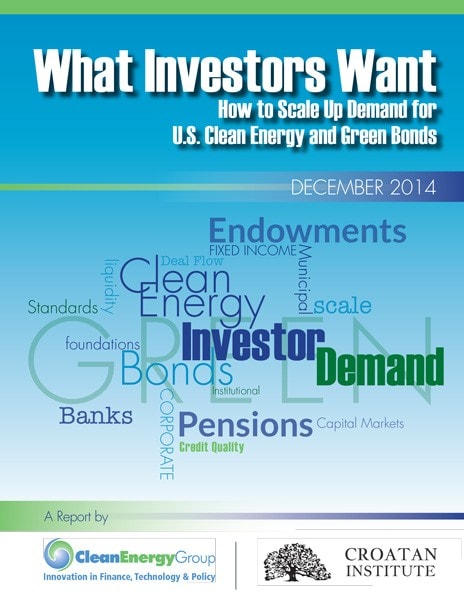What Investors Want: How to Scale-Up Demand for US Clean Energy and Green Bonds
December 9, 2014
Robert Sanders, Joshua Humphreys | Clean Energy Group, Croatan Institute
Clean Energy Group and Croatan Institute have released the first comprehensive study of U.S. institutional investors’ appetite for green bonds. The study, “What Investors Want: How to Scale-Up Demand for US Clean Energy and Green Bonds,” provides a blueprint for growing the market for fixed-income securities to finance clean energy projects and solve climate problems. Read the full report at the link to the right.
The report found that the U.S. market for fixed-income securities known as “green bonds” has become a robust and growing market. States, cities, government agencies, and corporations have issued billions of dollars of green bonds to finance investments in clean energy such as solar and wind projects and in energy efficiency.
The study examined what institutional investors need – and identified the demand characteristics that must be met – in order to make the decision to purchase these financial instruments and to make them part of a sound investment portfolio as well as to advance climate and clean energy goals. Among other things, the report found that liquidity, credit quality, and bond size are all key concerns for investors. The report also found that there is a critical need for investor education about green bonds, as well as standardization of deal structures and documentation. Importantly, for universities, foundations, pension funds, and other institutional investors, green bonds present an opportunity to align their investments with their missions, without compromising their fiduciary responsibilities.
“Most of today’s discussions about green bonds have focused on high-quality bonds issued by international financial institutions and development banks, but the U.S. also has a vigorous tradition of using bonds to finance renewable energy” says Joshua Humphreys, president and senior fellow of Croatan Institute and a co-author of the study. “Investors and issuers are beginning to recognize the opportunity that green bond finance presents for investing in energy solutions we need. This paper provides an analysis and an action plan to realize the full potential of green bonds.”
“Clean energy and green bonds will become an important way to scale up clean energy finance and solve climate problems,” said Lewis Milford, President of Clean Energy Group. “Also, these bonds are a new option for investors who want to divest from fossil fuels. For those who want to take money away from fossil-fuel industries, they should also consider ways to take the market away from carbon-based businesses by investing in clean energy bonds.”
“We applaud this research, which provides an in-depth review of the Green Bond market and investor expectations,” said Marilyn Ceci, Managing Director & Head of Green Bonds, J.P. Morgan. “This is welcome insight into a rapidly growing market.”
The two groups conducted interviews with a broad cross-section of bond buyers, asset managers and investment consultants, foundation endowments, faith-based investors, investment banks, corporations and insurers, and public pension funds. Preliminary findings from the inquiry were also discussed at a side event to the United Nations Climate Summit in New York City in September 2014. The convening included many of the interviewees, bond buying asset managers and institutional investors, credit rating agencies, underwriters, investment consultants, philanthropic foundations, and other stakeholders.
Understanding the demand characteristics of institutional investors will enhance new opportunities to increase fixed-income investments in clean energy.
A centerpiece of the report is a set of recommendations that provide an action plan for helping grow demand for these kinds of securities. The recommendations focus on three key areas of activity: further research and analysis, convening and greater exchange of information among investors and other market participants, and ways to develop, diversify and deepen deal flow.





